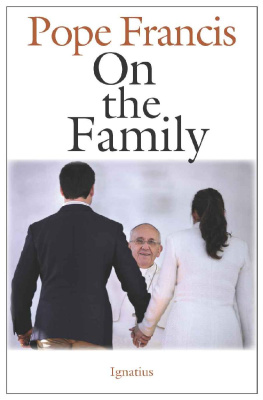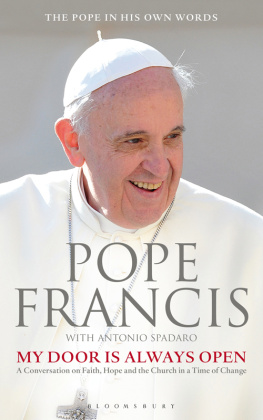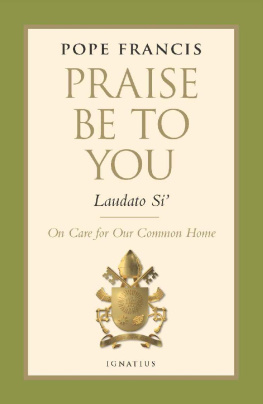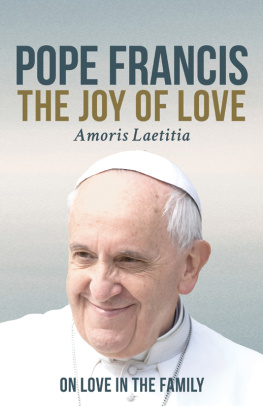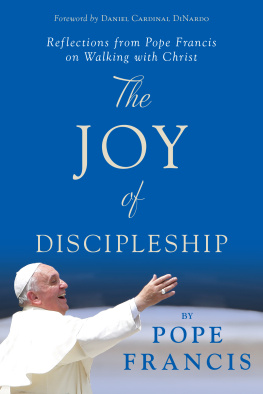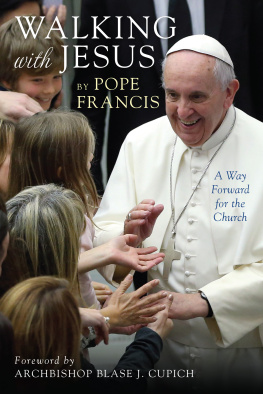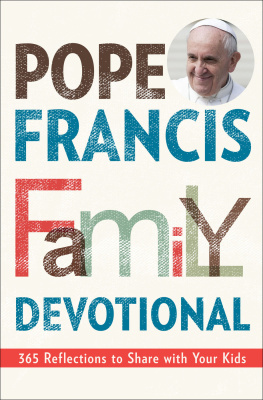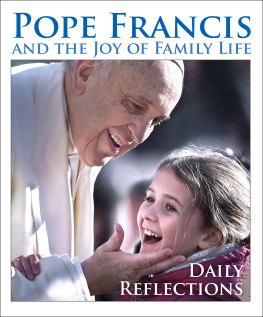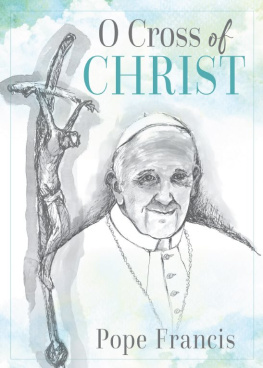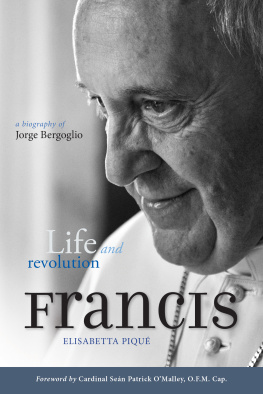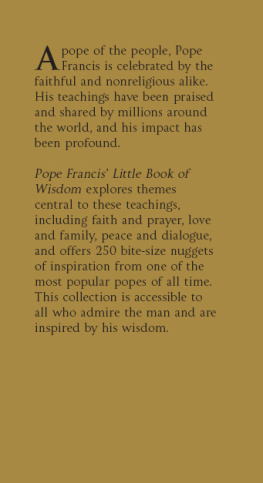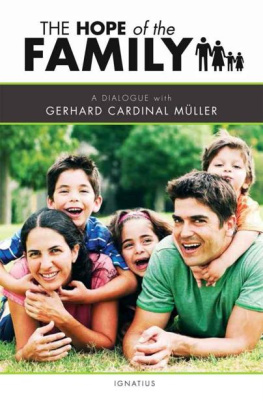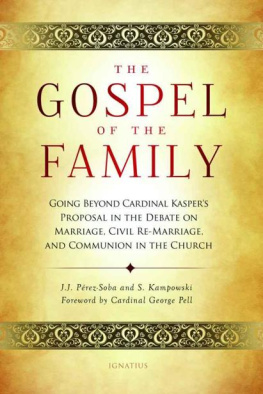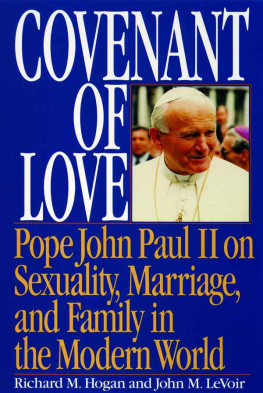ON THE FAMILY
POPE FRANCIS
ON THE FAMILY
General Audiences
17 December 2014 16 September 2015
IGNATIUS PRESS SAN FRANCISCO
English translation by LOsservatore Romano
Cover photograph by Stefano Spaziani
Cover design by Roxanne Mei Lum
2015 by Libreria Editrice Vaticana, Vatican City
2015 by Ignatius Press, San Francisco
All rights reserved
ISBN 978-1-62164-100-1 (PB)
ISBN 978-1-68149-689-4 (EB)
Library of Congress Control Number 2015953756
Printed in the United States of America
CONTENTS
1
Nazareth
Saint Peters Square
Wednesday, 17 December 2014
Dear Brothers and Sisters, Good morning ,
The Synod of Bishops on the Family, recently celebrated, was the first stage of a journey, which will conclude next October with the celebration of another Assembly on the theme: The Vocation and Mission of the Family in the Church and [Contemporary] World. The prayer and reflection which must accompany this journey is required of all the People of God. I would also like the customary meditations of the Wednesday Audiences to be included in this common journey. I have therefore decided to reflect with you, this year, precisely on the family, on this great gift that the Lord has made to the world from the very beginning, when he entrusted Adam and Eve with the mission to multiply and fill the earth (cf. Gen 1:28); that gift that Jesus confirmed and sealed in his Gospel.
The nearness of Christmas casts a great light on this mystery. The Incarnation of the Son of God opens a new beginning in the universal history of man and woman. And this new beginning happens within a family, in Nazareth. Jesus was born in a family. He could have come in a spectacular way, or as a warrior, an emperor... No, no: he is born in a family, in a family. This is important: to perceive in the nativity, this beautiful scene.
God chose to come into the world in a human family, which he himself formed. He formed it in a remote village on the outskirts of the Roman Empire. Not in Rome, which was the capital of the Empire, not in a big city, but on its nearly invisible outskirts, indeed, of little renown. The Gospels also recall this, almost as a figure of speech: Can anything good come out of Nazareth? (Jn 1:46). Perhaps, in many parts of the world, we still talk this way, when we hear the name of some areas on the periphery of a big city. And so, right there, on the outskirts of the great Empire, began the most holy and good story of Jesus among men! And that is where this family was.
Jesus dwelled on that periphery for thirty years. The Evangelist Luke summarizes this period like this: Jesus was obedient to themthat is, to Mary and Joseph. And someone might say: But did this God, who comes to save us, waste thirty years there, in that suburban slum? He wasted thirty years! He wanted this. Jesus path was in that familyand his mother kept all these things in her heart. And Jesus increased in wisdom and in stature, and in favor with God and man (Lk 2:51-52). It does not recount miracles or healing or preachinghe did none in that periodor of crowds flocking; in Nazareth everything seemed to happen normally, according to the customs of a pious and hardworking Israelite family: they worked, the mother cooked, she did all the housework, ironed shirts... all the things mothers do. The father, a carpenter, worked, taught his son the trade. Thirty years. But what a waste, Father! God works in mysterious ways. But what was important there was the family! And this was not a waste! They were great saints: Mary, the most holy woman, immaculate, and Joseph, a most righteous man.... The family.
We are certainly moved by the story of how the adolescent Jesus followed the religious calendar of the community and the social duties; in knowing how, as a young worker, he worked with Joseph; and then how he took part in listening to the Scriptures, in praying the Psalms, and in so many other customs of daily life. The Gospels, in their sobriety, make no reference to Jesus adolescence and leave this task to our loving meditation. Art, literature, music have taken this journey through imagination. It is certainly not difficult to imagine how much mothers could learn from Marys care for that Son! And how much fathers could glean from the example of Joseph, a righteous man, who dedicated his life to supporting and protecting the Child and his wifehis familyin difficult times. Not to mention how much children could be encouraged by the adolescent Jesus to understand the necessity and beauty of cultivating their most profound vocation and of dreaming great dreams! In those thirty years, Jesus cultivated his vocation, for which the Father had sent him. And in that time, Jesus never became discouraged, but increased in courage in order to carry his mission forward.
Each Christian family can first of allas Mary and Joseph didwelcome Jesus, listen to him, speak with him, guard him, protect him, grow with him; and in this way improve the world. Let us make room in our heart and in our day for the Lord. As Mary and Joseph also did, and it was not easy: how many difficulties they had to overcome! They were not a superficial family, they were not an unreal family. The family of Nazareth urges us to rediscover the vocation and mission of the family, of every family. And, what happened in those thirty years in Nazareth can thus happen to us, too: in seeking to make love and not hate normal, making mutual help commonplace, not indifference or enmity. It is no coincidence, then, that Nazareth means She who keeps, like Mary, whoas the Gospel stateskept all these things in her heart (cf. Lk 2:19, 51). Since then, each time there is a family that keeps this mystery, even if it be on the periphery of the world, the mystery of the Son of God, the mystery of Jesus who comes to save us, the mystery is at work. He comes to save the world. And this is the great mission of the family: to make room for Jesus who is coming, to welcome Jesus in the family, in each member: children, husband, wife, grandparents.... Jesus is there. Welcome him there, in order that he may grow spiritually in the family. May the Lord grant us this grace in these last days of Advent. Thank you.
2
The Mother
Paul VI Audience Hall
Wednesday, 7 January 2015
Dear Brothers and Sisters, Good morning .
Today we continue with catecheses on the Church, and we will reflect on Mother Church. The Church is mother. Our Holy Mother Church.
In these days, the Churchs liturgy sets before our eyes the icon of the Virgin Mary, Mother of God. The first day of the year is the Feast of the Mother of God, followed by the Epiphany, commemorating the visit of the Magi. The Evangelist Matthew writes: Going into the house they saw the child with Mary his mother, and they fell down and worshiped him (Mt 2:11). It is the Mother who, after giving birth to him, presents the Son to the world. She gives us Jesus, she shows us Jesus, she lets us see Jesus.
Let us continue with the catecheses on the family, and in the family there is the mother . Every human person owes his or her life to a mother, and almost always owes much of what follows in life, both human and spiritual formation, to her. Yet, despite being highly lauded from a symbolic point of viewmany poems, many beautiful things said poetically of herthe mother is rarely listened to or helped in daily life, rarely considered central to society in her role. Rather, often the readiness of mothers to make sacrifices for their children is taken advantage of so as to save on social spending.
It also happens that in Christian communities the mother is not always held in the right regard; she is barely heard. Yet the center of the life of the Church is the Mother of Jesus. Perhaps mothers, ready to sacrifice so much for their children and often for others as well, ought to be listened to more. We should understand more about their daily struggle to be efficient at work and attentive and affectionate in the family; we should better grasp what they aspire to in order to express the best and most authentic fruits of their emancipation. A mother with her children always has problems, always work. I remember there were five of us children at home, and while one was doing one thing, the other wanted to do another, and our poor mama went back and forth from ones side to another, but she was happy. She gave us so much.
Next page
